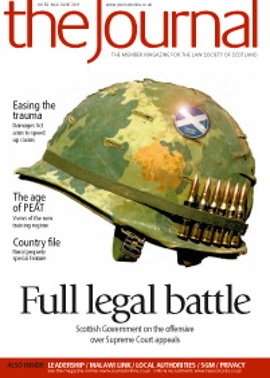Damages for our times

The Damages (Scotland) Act 2011 was passed by the Scottish Parliament as a member’s bill sponsored by Bill Butler MSP. It arose from the Scottish Law Commission (SLC) Report on Damages for Wrongful Death (no 213), published in September 2008.
The SLC had concluded that the Damages (Scotland) Act 1976 had become “over complex and indeed contains inaccuracies as a consequence of the numerous amendments to it”, and therefore “should be repealed and replaced by new legislation which will restate the current law with greater clarity and accuracy”. Also with reference to the Rights of Relatives to Damages (Mesothelioma) (Scotland) Act 2007, the SLC was asked to consider whether there were other diseases or injuries which should be similarly covered.
The SLC’s report and the subsequent parliamentary process have resulted in some new, fundamental and far-reaching changes.
Percentage support
The first changes are to be found in the new Act’s treatment of loss of support (see s 7), which to date had been founded on Brown v Ferguson 1990 SLT 274. These are: (1) fixing a percentage for loss of support; (2) ignoring the spouse’s or civil partner’s income; and (3) providing an exception to that fixed percentage.
Regarding (1), the SLC reasoned that there should be a rule that a fixed 75% of the deceased’s net income should be taken as support for his or her relatives (i.e. he or she spent 25% on him or herself). That would give simplicity and clarity and lead to less delay in the resolution of cases.
The SLC gave some worked examples. The Judges Council on the contrary, in its contribution to the consultation on the bill, submitted that each case must be looked at on its own facts and circumstances. Its submission, in fact, demonstrated how complex and varied that exercise can be, militating against the objectives of the SLC reasoning and additionally increasing the uncertainty of litigation (see Wotherspoon v Strathclyde Regional Council 1992 SLT 1090, Weir v Robertson Group (Construction) Ltd [2006] CSOH 107, Guilbert v Allianz Insurance plc [2009] CSOH 10, and others).
There was also evidence given to the Justice Committee that the amount of the deceased’s living expenses was overestimated, thus indicating an undercompensation because of unwillingness on the part of pursuers to seek a greater figure, due to the prospect of intrusion into their finances and the delay and stress of litigation. Another contributor indicated other possible cases of undercompensation, for example a worker with six children. The Justice Committee and the Scottish Government in the end had little difficulty in balancing the objectives of simplicity and lack of delay with the SLC’s fixed percentage of 75%.
Family circumstances
As for (2), the Justice Committee and the Scottish Government had no difficulty in accepting the SLC’s reasoning (see paras 3.41-3.44 of SLC Report no 213). It was appreciated that the socio-economic dynamics in families had changed since 1976. What was important was the loss of the income of the deceased to the surviving family, not so much whether there was a survivor’s income. Indeed, in the evidence given before the Justice Committee, there was little discussion, if any, of this aspect.
So far as (3) is concerned, the Justice Committee and the Scottish Government still felt uncomfortable that there might be cases of over- or undercompensation. Yet the ministers did not want to lose the stated objectives of the SLC which would apply to most cases. In turn, the SLC did not want a rule with exceptions, whether on the basis of rebuttable presumption or special cause, otherwise it saw the aims of simplicity and saving time as being undermined. A Government amendment was introduced and accepted by Bill Butler in s 7(2) of the Act which states: “But, if satisfied that it is necessary to do so for the purpose of avoiding a manifestly and materially unfair result, the court may apply a different percentage to that specified in subsection (1)(a).”
The minister explained the intention behind the amendment at the stage 3 debate, saying: “It was agreed that the standard assumption could be set aside in those few cases in which its rigid application would lead to a ‘manifestly and materially unfair’ outcome. That should allow some flexibility, but it requires a very high test to be met. A second qualification related to the disregarding of the surviving spouse’s income. Let me make it crystal clear that we agree that a relative’s income should generally be disregarded. It should be taken into account only in those truly exceptional cases in which ignoring it would lead to a manifestly and materially unfair result – and then only in relation to fixing the appropriate percentage. Otherwise, it should be of no account at all.”
It will be noted that the Act does not mention taking into account the surviving spouse’s income, but in the stage 3 debate the minister makes it clear that even were the exception to apply, it only applies to the net income of the deceased, and not as a final deduction as stipulated in the Brown v Ferguson formula (see above) after the overall apportionment is done. The minister said: “It can no longer be argued that the Brown v Ferguson formula is relevant.”
The relative for whom the fixed award of 75% is available (subject to the exception) is a spouse or civil partner or a dependent child, defined as a child who has not attained the age of 18 years and who is owed an obligation of aliment by the deceased. Significantly, if there is any other relative who is making a claim for loss of support, it has to come from the 75% award. Also it should be noted that if there is only a dependent child and no spouse or civil partner, they would still get the full award.
Contrary to Dingwall v Walter Alexander & Sons 1981 SLT 313; 1982 SC (HL) 179, any multiplier is to run from the date of the interlocutor awarding damages, rather than applying from the date of death: s 7(1)(d). Section 8(1) details the payments of which no account is to be taken.
Loss of life expectancy
Secondly, there are also parallel fundamental changes to cases of loss of life expectancy. There is a dearth of authority in Scotland on living expenses, and indeed considerable debate on what was to be taken into account in cases in England & Wales (see Harris v Empress Motors Ltd [1984] 1 WLR 212, and Scottish interim damages case, Fletcher (Smart’s Guardian) v Lunan [2008] CSOH 55, Lord Carloway). Regardless of the lack of authority on the matter, the proportion of living expenses was always lower than loss of support proportions especially in spouse and civil partnership situations.
The prospect of intrusion into their finances and the stress and delay of litigation could be said to be even more crucial in this category of case.
The argument for the fixed percentage was therefore even more compelling. There was also a logic and consistency with the loss of support situation, because many of the factors to be taken into account in living expenses are considered in a loss of life expectancy case, i.e. spending on others, joint income, dependent children and personal expenses. Whatever the case, s 1(6)(c) provides that the living expenses of the dying person are to be taken as 25%, which in effect means that he or she gets the remaining 75% as loss of income. Here, there is potentially the same exception by virtue of s 1(7) for a manifestly and materially unfair result.
Qualifying relatives
The provisions regarding distress, anxiety, grief and sorrow, loss of society (collectively referred to as “loss of society”) and loss of support are stipulated in s 4(3)(a) and (b) of the Act. Loss of society will apply to immediate family in terms of s 4(1)(a). “Immediate family” is defined as a relative falling within paras (a) to (d) of the definition of “relative” in s 14(1). Note also the inclusion of the half blood for the purposes of loss of society in terms of s 14(2)(a)(ii); this is not excluded by s 4(5)(b). It should be noted that there is a difference from the 1976 Act, whereby not only is the grandparent or grandchild covered, but someone who accepted the deceased as a grandchild of the deceased or who was accepted by the deceased as a grandchild of the deceased. The rest of the relatives who are only entitled to loss of support are also defined in s 14.
Further provisions
There are other provisions in the new Act, such as: transmission of deceased’s rights to executor (s 2), restrictions on transmission of a claim for non-patrimonial loss for injury to name or reputation, or injury resulting from harassment actionable under s 8 of the Protection from Harassment Act 1997 (s 2), providing for loss of personal services in terms of the Administration of Justice Act 1982 in fatal cases and loss of expectation cases (ss 6 and 13), and avoiding double counting of patrimonial loss in a provisional damages case (s 8(3)).
Royal assent was granted on 7 April 2011. The statutory instrument giving the commencement date has not yet been laid down, but it is anticipated that commencement will be in the next month or two. The Act will apply to cases in which proceedings are raised after the date of commencement. Agents will have to give careful consideration to this issue and the implications for their client(s). For example, proceedings might be commenced routinely without appreciating the potential repercussions for a particular case (by way of over- or undercompensation), and there are also those cases of loss of life expectancy where a balance would have to be struck between proceeding as soon as possible on the one hand and delaying proceedings to gain the advantages of the Act.
In this issue
- Breaking new ground
- A&A accounts and abatements
- What price privacy?
- Power struggle
- Rural peace?
- Damages for our times
- Grief revalued
- Up to speed?
- Into Africa
- Expenses review opens with invitation on issues
- Law reform update
- From the Brussels office
- Dundee students join advice network
- The learning curve
- Ask Ash
- Guiding hands
- Marriage made in heaven?
- Email on the spot
- One for the accused to prove
- Going for growth
- A brake on termination?
- The colour yellow
- All change on the croft
- Natural justice in play
- Website review
- Book reviews
- A time of opportunity
- Rural property - Who wants to be a green wellie conveyancer?
- Rural property - Buying and selling: pitfalls and problems
- Rural property - In the taxman's sights
- Rural property - Farm tenancies: more changes imminent
- Now we are 10






